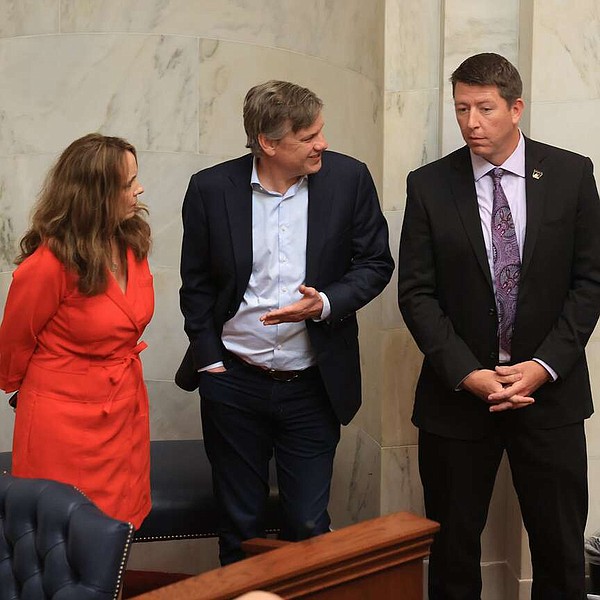Enquires@newsofbitcoin.com
A Senate committee voted Tuesday to advance two amended bills meant to impose greater restrictions on crypto mining in Arkansas.
Senate Bill 78 and Senate Bill 79, are sponsored by Sen. Joshua Bryant, R-Rogers, and Sen. Missy Irvin, R-Mountain View, respectively. The Senate City, County and Local Affairs committee voted to approve amendments to the bills Thursday but asked the lawmakers to come before the body again Tuesday to ensure the public would have a chance to comment on them.
The Senate voted earlier Tuesday in favor of Bryant’s amendment and voted to re-refer Irvin’s bill at her request to the City, County and Local Affairs Committee to present its members with a tightened definition of blockchain networks.
Bryant’s legislation would restore local control to counties by repealing part of the Arkansas Data Centers Act of 2023, or Act 851. Bryant sponsored the act but has since expressed regret over the law.
It also also would establish standards requiring crypto mines to use noise reduction techniques, such as requiring a fully closed envelope around loud equipment, using liquid or submerged cooling, or remaining 2,000 feet from the nearest residential or commercial structures.
Bryant’s amendment aims to narrow the bill’s definition of “enclosed structure” and adjusts its language regarding foreign ownership to match a similar section in Irvin’s bill. It also clarifies when property owners have standing to file a lawsuit in circuit court to enforce noise reduction techniques.
Senate Bill 78, which remained unchanged since an amended version was brought before the committee Thursday, passed a second time.
Irvin’s bill aims to provide a basic framework for state oversight of crypto mining in conjunction with local governing authorities. A new amendment introduced and adopted Tuesday narrows the bill’s definition of “digital asset mining business” to clarify that it refers to businesses in the crypto mining industry that are using blockchain networks.
The bill defines a digital asset mining business as “group of computers working at a single site that consumes more than one megawatt of electrical energy on an average annual basis for the purpose of generating digital assets by securing a blockchain network.” It defines a blockchain network as “a group of computers operating and processing together to execute a consensus mechanism to agree upon and verify data in a digital record for the purpose of generating digital assets.” Those digital assets include cryptocurrency, virtual currency and “natively electronic assets.”
Under both bills, a prohibited foreign party-controlled business includes one in which the party possesses an “ownership interest of greater than zero percent.”
The bills define a prohibited foreign party as a person, party or government subject to the International Traffic in Arms Regulations, which are federal rules meant to restrict the sale of arms to and from certain foreign governments. Many lawmakers have expressed concerns that some crypto operations have ties to China or other adversaries of the United States.
The proposed legislation also states that civil penalties and damages received by the attorney general’s office under the section on foreign-party-controlled businesses would be split between the state Oil and Gas Commission fund and the attorney general’s office.
The bills provide a foreign party-controlled business in operation before its effective date one year to divest all interest in the digital asset mining business.
Asked by Sen. Terry Rice, R-Waldron, why such businesses would be allowed a year to do so, Irvin said the original legislation would have limited them to 120 days; however, they made the change at the request of Arkansas Attorney General Tim Griffin’s office. The attorney general cited legal precedent as the reason behind the request, according to Irvin.
Rice asked if the decision took into consideration whether the change would make it more difficult for authorities to respond to a “hostile aggressor among us.”
“We are living in a very uncertain world,” he said.
Irvin replied that she and Bryant used the language suggested by Griffin’s office “to give it the strongest legal standing,” but added “I do think we are going to have to perhaps potentially address that.”
No members of the public appeared to speak on either bill during the committee meeting.
During the Senate floor session, Sen. Bryan King, R-Green Forest, told Bryant he didn’t understand how the section of Senate Bill 78 regarding when property owners have standing to file lawsuits in circuit court would change the status quo. He said crypto mining businesses “always” send cases to federal court.
“They want everything in federal court, where it takes longer, much more money [and is] harder to beat for the average citizen against the top, most expensive lawyers that they can hire,” he said.
Bryant answered that property owners with standing to file a lawsuit “can choose whatever court they want to choose.”
“But the crypto industry, if they choose to go into a federal court to litigate, that is their choice,” King said.
King also asked why the section of Bryant’s bill about the meaning of “fully enclosing the envelope” for the purpose of noise reduction relies in part on industry standards.
The proposed legislation states such an envelope must be made “with material that is reasonably calculated by industry standards to reduce noise emissions to a level that is acceptable to a reasonable person under similar circumstances.”
The language in that section was suggested by the Arkansas Association of Counties, based upon its County Judges Association, to ensure documentation exists to support the reason a crypto mining business wants to use a specific enclosure, according to Bryant. He said Faulkner County Judge Allen Dodson made the initial recommendation.
King had introduced six resolutions regarding crypto mining at the start of the fiscal session. Although his resolutions initially cleared the Senate, mirror resolutions introduced by Rep. Josh Miller, R-Heber Springs, in the House were voted down by representatives April 17.
The Senate will take up Bryant’s and Irvin’s bills again when it convenes at 1 p.m. today.
Read More: Senate committee advances 2 amended crypto mining bills pushing greater restrictions |
Disclaimer:The information provided on this website does not constitute investment advice, financial advice, trading advice, or any other sort of advice and you should not treat any of the website’s content as such. NewsOfBitcoin.com does not recommend that any cryptocurrency should be bought, sold, or held by you. Do conduct your own due diligence and consult your financial advisor before making any investment decisions.


